
ГОСУДАРСТВЕННОЕ АВТОНОМНОЕ ПРОФЕССИОНАЛЬНОЕ ОБРАЗОВАТЕЛЬНОЕ УЧРЕЖДЕНИЕ РЕСПУБЛИКИ БАШКОРТОСТАН
«БЕЛЕБЕЕВСКИЙ МЕДИЦИНСКИЙ КОЛЛЕДЖ»
(ГАПОУ РБ «Белебеевский медицинский колледж»)
РАБОЧАЯ ТЕТРАДЬ
по учебной дисциплине
ОУД. 02. Иностранный язык
для студентов 1 курса
специальность 34.02.01 Сестринское дело
базовой подготовки
2020 г.
Рассмотрена на заседании ЦМК общеобразовательных, ОГСЭ и ЕН дисциплин Протокол № 1 «31» 08 2020 г. _____________/И.А. Полякова/
|
Составлена в соответствии с рабочей программой по дисциплине ОУД. 02. Иностранный язык по специальности 34.02.01 Сестринское дело базовой подготовки.
Зав. отделом по УР ____________ /Л.Р. Логанова/ |
Разработчик:
Л.С. Горева - преподаватель дисциплины «Иностранный язык» ГАПОУ РБ «Белебеевский медицинский колледж».
Рабочая тетрадь по учебной дисциплине ОУД. 02. Иностранный язык представляет собой сборник дополнительных упражнений по основным видам речевой деятельности для студентов, изучающих дисциплину в медицинских колледжах в рамках освоения программ профессиональной подготовки. Может быть использована в ходе проведения аудиторных занятий, а также для организации самостоятельной работы обучающихся.
В процессе самостоятельной работы студент формирует умение общаться (устно и письменно) на английском языке на повседневные темы, переводить (со словарем) английские тексты, самостоятельно совершенствовать устную и письменную речь, пополнять словарный запас.
Уважаемый студент!
Рабочая тетрадь предназначена в помощь студентам при изучении дисциплины «Иностранный язык». Главной целью изучения дисциплины в медицинском колледже является приобретение знаний и умений, которые будут необходимы при изучении общепрофессиональных и клинических дисциплин.
В результате освоения дисциплины обучающийся должен уметь:
· общаться (устно и письменно) на английском языке на повседневные темы;
· переводить (со словарем) английские тексты разной тематики и направленности;
· самостоятельно совершенствовать устную и письменную речь, пополнять словарный запас;
В результате освоения дисциплины обучающийся должен знать:
· лексический минимум (1200-1400 лексических единиц) необходимый для чтения и перевода (со словарем) иностранных текстов.
· грамматический минимум, необходимый для чтения и перевода (со словарем) иностранных текстов.
Уважаемый студент, чтобы успешно освоить учебный материал, рекомендуем следующий порядок работы с данной рабочей тетрадью:
1. Повторите теоретический материал, используя учебную литературу, записи лекционных занятий.
2. Разберите блок теоретической информации по темам, изучение которых не предусмотрено на лекционных занятиях.
3. Выполните практические упражнения.
4. Если возникли трудности:
- вернитесь к теоретическому материалу;
- используйте учебную литературу и справочники;
- используйте электронные ресурсы;
- обратитесь за помощью и консультацией к преподавателю.
Unit 1 (Урок 1).
Grammar: Personal pronouns, the verb to be
1. Вставьте подходящие по смыслу личные местоимения.
1. Ben is a little boy. … is six.
2. Max is a soldier. … is brave.
3. Lily is a young woman. … is very beautiful.
4. Nick and Ann are far from Moscow. … are on a farm.
5. This is Ben's room. … is nice.
2. Вставьте соответствующие личные местоимения в предлагаемых ответах на вопросы.
1. Is your house new? – Yes, … is.
2. Are the students at the English lesson now? - Yes, ... are.
3. Is your college in Green Street? – Yes, … is.
4. Are Helen and Bess your sisters? – Yes, … are.
5. Is Ben's sister an engineer? – Yes, … is.
3. Заполните пропуски соответствующей формой глагола to be.
1. You …… from Australia.
2. My English teacher …… Mr Simpson.
3. I …… seventeen years old.
4. My pencil …… in my bag.
5. We …… at home.
4. Составьте предложения, используя отрицательную форму глагола to be.
1. This coffee / hot.
2. Sam / in the classroom.
3. We / eighteen years old.
4. They / from Spain.
5. I / hungry.
5. Образуйте из предложенных слов вопросительные предложения. Затем подберите к ним подходящие по смыслу ответы.
1. Martin / name / your / is / ?
2. you / are / Russia / from / ?
3. at / home / is / dad / your / ?
4. teachers / and Helen / are / Ben / ?
5. Sarah / is / hungry/ ?
a). Yes, he is. b). No, they aren´t. c). No, it isn´t.
d). Yes, she is. e). Yes, we are. f). Yes, I am.
Unit 2 (Урок 2).
Grammar: Possessive pronouns, have got
1. Вставьте притяжательные местоимения.
1. Is your bag new? - Yes, … bag is new .
2. I like … hat, Ann.
3. Don't plant this tree! … branch is broken.
4. Max, you have a new job. Do you like … new job?
5. … friends always tell me everything.
2. Вставьте вместо пропусков подходящую форму выражения have got.
1. I … a comfortable flat.
2. Nick … many friends.
3. They … a lot of flowers in their garden.
4. She … long hair.
5. The farm … two new tractors.
3. Образуйте вопросительную форму и дайте ответы.
1. Ann has got a new coat.
2. Nick has got a scooter.
3. They have got an old garden.
4. The hunter has got a dog.
5. You have got two apple-trees in the garden.
Unit 3 (Урок 3).
Vocabulary, reading & writing: Describing people
1. Прочтите текст, определите верны ли следующие утверждения:
As you know people from different countries do not look the same. For example, people from Denmark, Norway and Sweden are usually tall. They have got fair hair, blue eyes and a pale skin.
Most people in Italy, Spain and Greece are short. They have got black or dark brown wavy hair, brown eyes and light brown skin.
Most people from Africa have got black curly hair and very dark skin. They have also got dark brown eyes, full lips and a wide, flattish nose.
People from Arab countries have got dark hair and dark brown eyes. They have got dark skin.
a). People from Norway and Sweden have got fair hair, brown eyes and light brown skin.
b). Most people in Italy, Spain and Greece are short and have got dark straight hair and dark brown eyes.
c). People from Africa have got black curly hair and very dark skin.
d). People from Arab countries have got fair hair, blue eyes and a pale skin.
2. Напишите текст о себе, выбрав подходящий вариант:
Hi! My name is ... I am fifteen (sixteen, seventeen, eighteen). I live in Belebey.
I am tall (not very tall, short, of middle height). I am thin (not very thin, rather plump). My face is round (square, oval). I have got a fair (dark) skin. I have got a straight (upturned, crooked) nose. I have got large (small) blue (hazel, black, grey) eyes. My hair is black (fair, dark, blond, chestnut), straight (curly) and long (short, not very long).
I study at the technical college. I like my future profession and I am going to do my best to become a good worker.
Unit 4 (Урок 4).
Vocabulary: Members of the family, possessive case
1. Проанализируйте семейное древо семьи Холли и дополните предложения, используя следующие слова:
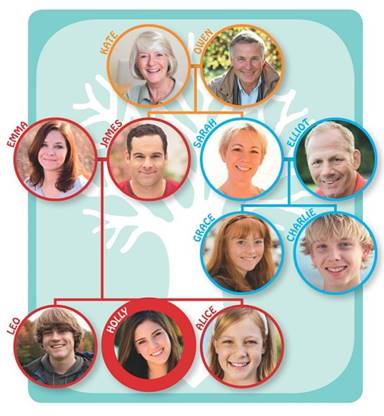
wife - жена
husband - муж
mother, mum - мама
father, dad - папа
son - сын
daughter - дочь
brother - брат
sister - сестра
grandmother - бабушка
grandfather - дедушка
grandson - внук
granddaughter – внучка
aunt - тетя
uncle - дядя
niece - племянница
nephew - племянник
cousin – двоюродный брат (сестра)
1. James is Holly´s … .
2. Leo is her … .
3. Kate is her … .
4. Emma is her … .
5. Alice is her … .
6. Owen is her … .
7. Sarah is her … .
8. Charlie is her … .
9. Elliot is her … .
2. Укажите родственные связи членов семьи Холли.
1. Leo is Sarah´s … .
2. James is Emma´s … .
3. Holly is Kate´s … .
4. Grace is Elliot´s … .
5. Kate is Owen´s … .
6. James is Kate´s … .
7. Alice is Sarah´s … .
8. Charlie is Owen´s … .
9. Sara is Leo´s … .
10. Emma is James´ … .
11. Kate is Holly´s … .
12. Elliot is Grace´s … .
13. Owen is Kate´s … .
14. Kate is James´ … .
15. Sarah is Alice´s … .
16. Owen is Charlie´s … .
3. Вставьте пропущенные слова.
children – дети
grandchildren - внуки
grandson - внук
granddaughter - внучка
parents – родители
grandparents - бабушка и дедушка
a). son + daughter = ?
b). mother + father = ?
c). grandmother + grandfather = ?
d). grandson + ? = ?
4. Заполните пропуски.
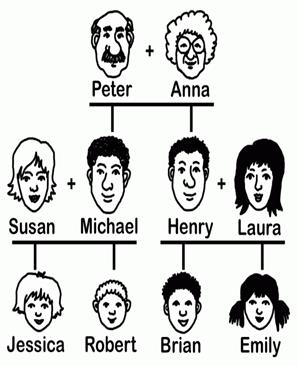 1. Anna is Brian's ………… …….
1. Anna is Brian's ………… …….
2. Jessica is Susan's ……………..
3. Michael is Robert's ……………
4. Henry is Laura's ………………
5. Emily is Brian's ………………
6. Henry is Robert's ………………
7. Brian is Henry's ……………….
8. Robert is Henry's ………………
9. Peter is Jessica's ……………….
10. Robert is Brian's ……………...
11. Anna is Peter's ……………….
12. Laura is Emily's ………………
13. Laura is Jessica's ……………..
14. Emily is Michael's ……………
15. Brian is Emily's ………………
Unit 5 (Урок 5).
Grammar: Present Simple
1. Поставьте глаголы в скобках в Present Simple Tense.
1. Сhildren (to like) to play computer games. 2. My sister (to read) English and French books. 3. Our cousin (to live) in the village. 4. Their son (to go) to school every day. 5. I (to want) to become a worker. 6. My grandmother (to take) me by the hand. 7. I (to see) my niece on Fridays. 8. My brother´s wife (to teach) Russian at school. 9. Our sister (to live) in the USA. 10. I always (to get) up at 7 o´clock.
2. Составьте предложения из следующих слов. Переведите эти предложения на русский язык.
1. every Monday, at a hospital, my wife, works.
2. watches, her son, TV, often.
3. by car, always, goes, their uncle, to the office.
4. my brother, early, home, usually, comes.
3. a). Образуйте форму 3-го лица единственного числа the Present Simple Tense следующих глаголов:
to sit, to read, to skate, to do, to ask, to see,
to come, to wash, to teach, to fly, to mix, to play.
б). Распределите их в следующие группы: -s [s], -s [z], -es [iz].
4. Вставьте вместо пропусков do, does, don´t, doesn’t.
a). … your dad work in Abakan? – No, he …
b). … your cousins live near the school? – Yes, they …
c). … your grandfather use computer? – No, he …
d). … her lessons start at 9 o´clock? – Yes, they …
e). … his niece drink coffee? – No, she …
5. Задайте вопросы, используя вопросительные слова в скобках.
1. My friends go to the country on Sundays. (Who? Why? When?) 2. Ann lives in the centre of the city. (Who? Where?) 3. Nick goes to the office by car. (Where?) 4. Ann's sisters live in the country most of the time. (Where? Who?) 5. Tom's brother always gets up very early. (Who?)
Unit 6 (Урок 6).
Vocabulary: The house
Grammar: There is / there are
1. Найдите данные слова на рисунке и переведите их на русский язык.
A. ROOMS (#1-10) B. PARTS OF A ROOM (#11)
a bathroom a balcony
a bedroom the ceiling
a dining room the floor
a garage the stairs
a garden the wall
a hall
a kitchen
a living room
a study
a toilet
C. THINGS IN A ROOM (#16-31)
an armchair
a bath
a bed
a carpet
a cooker
a cupboard
a fireplace
a fridge
a lamp
a light
a mirror
a plant
a shelf (shelves)
a shower
a sofa
a washing machine
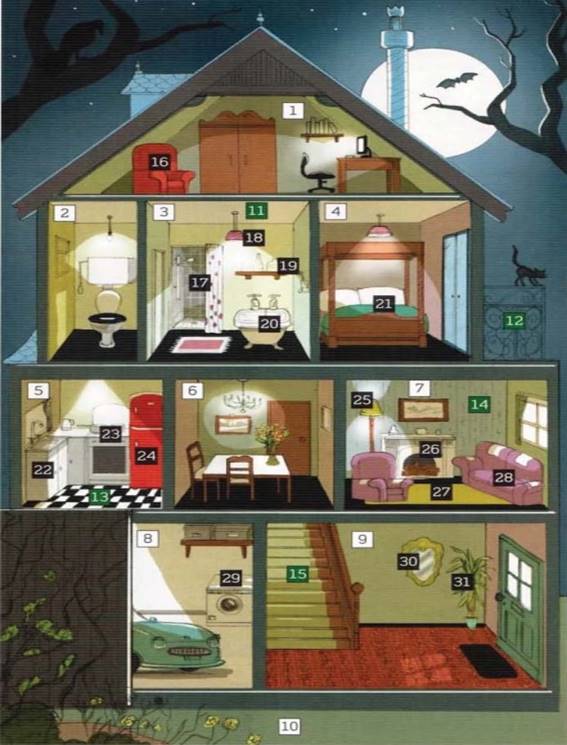
2. Выберите правильный вариант, переведите на русский язык.
1. There is / There are a bath in the bathroom. 2. There is / There are posters in my bedroom. 3.There isn´t / There aren´t a fireplace in our dining room. 4. There are / There aren´t any plants in my brother´s house. 5. There isn´t / There aren´t a computer in the hall. 6. There is / There are a fridge in the kitchen.
3. Закончите описание комнаты Тома.
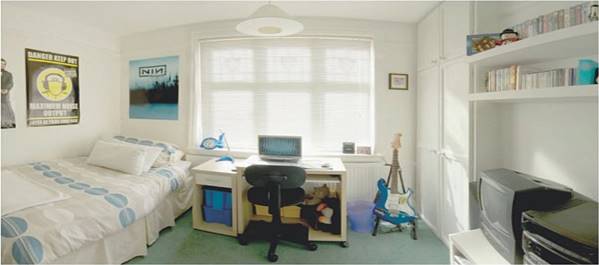
This is Tom´s room. It´s large and light. There is a bed … . There is a desk … . Tom´s computer is … . There is the lamp … . There are some shelves with books on them. There is a small TV … . Tom´s wardrobe is … . There are some posters … . There isn´t any carpet … . Tom´s guitar is … . There aren´t any plants … because Tom doesn´t like them.
Unit 7 (Урок 7).
Vocabulary: Numerals, the dates, prepositions of time.
1. Запишите числительные словами.
a). Количественные числительные:
3, 5, 11, 12, 13, 24, 69, 325, 1005, 530425.
б). Порядковые числительные:
1, 2, 15, 23, 84, 149, 150, 208, 1000, 2000000.
2. Запишите цифрами следующие даты.
a). the first of March nineteen seventy-six; b). the fifth of December two thousand; с). the sixteenth of May nineteen o five; d). the third of July nineteen hundred.
3. Вставьте пропущенные предлоги.
1. My dad´s birthday is … 3rd April. 2. I like watching TV … evening. 3. Her brother Alex does his morning exercises … the mornings. 4. Our niece was born … 1995. 5. The party is … Sunday. 6. `Mary and Lora often play volleyball … Monday morning. 7. We arrive home late … night. 8. This year the Christmas is celebrated … Wednesday the 7th of January. 9. They don´t watch TV … afternoon. 10. … 2011 Prince William married Catherine Middleton.
Unit 8 (Урок 8).
Vocabulary: Everyday activities
Grammar: Adverbs of frequency
1. Опишите типичный день Лизы, используя следующие выражения:

to get up early
to have breakfast
to have a shower
to go to work by bus (by car)
to start work

to have lunch
to finish work
to go home
to go shopping
to go to the gym

to make dinner
to have dinner
to do housework
to watch TV
to have
a bath
to go to bed
late
Unit 9 (Урок 9).
Vocabulary: Free-time activities
Grammar: Love, like, hate +V ing
1. Образуйте глагольные формы с –ing окончанием следующих слов, переведите
cycle, drive, listen, make, park, play, run, shop, serf,
study, swim, travel, write, draw, knit, sew, cook, ride, fish
2. Переведите предложения на английский язык.
1. Моя сестра любит танцевать. 2. Моему отцу не нравится ездить на работу на машине. 3. Мой друг увлекается бегом. 4. Ей не нравится делать покупки по выходным. 5. Я люблю готовить ужин для всей семьи. 6. Их бабушка любит вязать и шить. 7. Его родители увлекаются рисованием. 8. Вам нравится рыбачить зимой? 9. После занятий я люблю работать в интернете. 10. Нам не нравится учиться в субботу.
3. Соотнесите название хобби с фотографией.
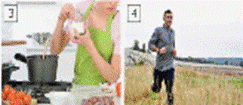

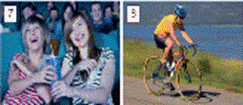
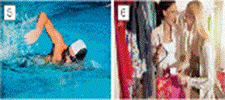
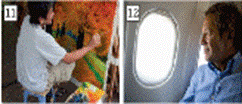
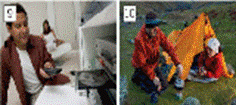
a). camping
b). buying clothes
c). cooking
d). cycling
e). flying
f). going to the cinema
g). reading
h). running
i). swimming
j). painting
k). travelling
l). watching DVDs
4. a). Познакомьтесь с правилами написания зарубежных почтовых адресов.

б). Напишите собственный почтовый адрес.
5. Соотнесите указания направления с изображениями.
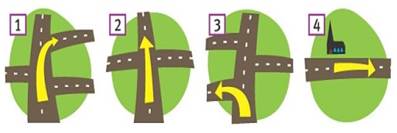
a). go straight on
b). take the first left
c). take the second right
d). go past the church
Unit 10 (Урок 10).
Vocabulary: Food, shops
Grammar: Countable and uncountable nouns, some / any
1. Выберите правильный вариант, обращая внимание на правильное использование исчисляемых и неисчисляемых существительных.
1. Alex has got much information / informations about our travel. 2. Their sister wants to buy new furniture / furnitures. 3. Your hair / hairs is fair. 4. My granny always gives me some advice / advices. 5. It´s healthy to drink fresh water / waters. 6. Her dad doesn´t buy new sunglass / sunglasses.
2. Соотнесите указанные слова с изображениями.
apples bananas beef butter cabbage carrots cheese chicken eggs grapes ham lamb lemons mushrooms onions oranges peppers pork potatoes prawns rice salmon tomatoes tuna
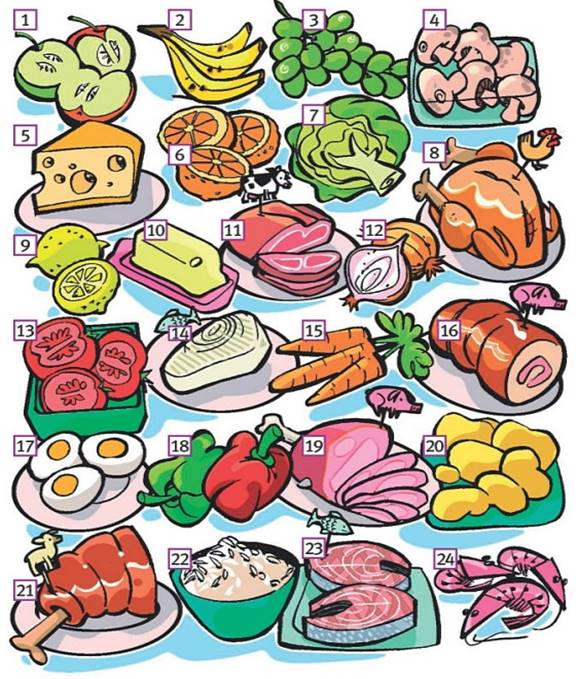
3. Вставьте some или any.
1. There are … students in the library. 2. There isn't … light in the room. 3. Mary has got two sisters but she hasn't got … brothers. 4. I don't like popular music but … people like it. 5. Has mother … meat for dinner? – Yes, she has … . 6. Are there … mistakes in Nick's dictation? – No, there are not … . 7. Has Max … friends here? – Yes, he has … . 8. Has Bess … interesting books to read? – No, she hasn't … . 9. Would you like … coffee? 10. Can I have … tea, please?
4. Образуйте словосочетания и переведите их на русский язык.
a loaf cheese
a bottle toothpaste
a slice soup
a liter sardines
a glass bread
a bar of lemonade
a jar meat
a kilo wine
a tube soap
a tin orange jam
a plate chocolate
Unit 11 (Урок 11).
Vocabulary: Sports
Grammar: Comparison of adjectives
1. а). Найдите соответствия.
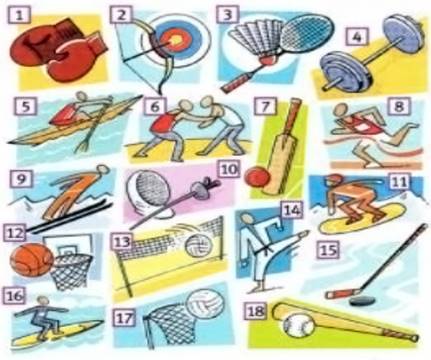
a). archery
b). athletics
c). badminton
d). baseball
e). basketball
f). boxing
g). cricket
h). fencing
i). ice hockey
j). karate
k). netball
l). rowing
m). ski jumping
n). snowboarding
o). surfing
p). volleyball
q). wrestling
r). weightlifting
б). Распределите виды спорта из части а) в следующие группы (некоторые виды спорта могут быть отнесены к разным группам):
- winter sports, - combat sports, - team sports,
- indoor sports, - outdoor sports
2. Выберите правильный вариант степени сравнения прилагательного. Переведите предложения на русский язык.
1. Nick is (happier, the happiest) boy that I know. 2. Of the six cars, I like the silver one (better, best). 3. Jane’s notebook is (cheaper, the cheapest) than mine. 4. This is (more delicious, the most delicious) cheese-cake I have ever had! 5. This bookcase is (more beautiful, the most beautiful)than that one. 6. Do you feel (better, the best) today than yesterday? 7. I think my cat is (prettier, the prettiest) of all the cats in the world. 8. Steve Jobs is (more famous, famouser) than Stephen Wozniak. 9. This week the weather is (hotter, more hot) than last week. 10. Our new house is(more expensive, expensiver) than the old one.
3. Соотнесите название игры с текстом.
- football - baseball - basketball - cricket - chess
1. It is a game of two players. Each of then starts with sixteen different playing pieces to move on the board. The aim is to move your pieces so that your opponent’s king will be taken.
2. This game is played on a court with a large orange ball. There are five players in each team. Two teams try to score goals by throwing a ball through a net fixed to a metal ring at each end of court. The players bounce the ball while running, and pass it to each other. The team with the most points wins.
3. It is a game between two teams and is played on a field with a bat and a small white ball. Each team consists of nine players. The teams take turns playing in the field and batting the ball. The game has nine innings.
4. It is a game played between two teams of eleven players. Players kick a ball around a field trying to score a goal. The team with the most points wins. This game is very popular in Russia and all over the world.
5. It is sometimes called an English national game. It is known that people played it in England as early as 1550. It is a very long game. International matches last for 5 days. This game is not played only by men; girls and women play it too.
4. Раскройте скобки, употребляя нужную форму прилагательного.
1. Her eyes are (grey) than mine. 2. He is (fat) man in the village. 3. My sister is (tall) girl in our class. 4. Who is (attentive) in your group? 5. It is autumn. Every day the air becomes (cold), the leaves (yellow). 6. Oil is (light) than water. 7. The (tall) trees in the world grow in California. 8. This is (beautiful) view I have ever seen in my life. 9. The Volga is (short) than Mississippi. 10. Which building is (high) in Moscow? 11. She speaks Italian (good) than French. 12. January is (cold) month of the year.
5. Вставьте as… as… или so… as… .
1. Mike is … tall … Pete. 2. Kate is not … nice … Ann. 3. My room is … light … this one. 4. Sergei is … old … Mike. 5. She is … young … Tom´s brother. 6. Nick´s English is not … good … his friend´s. 7. I am not … tall … Pete. 8. Alex is … lazy … his brother. 9. This child is not … small … that one. 10. A football match isn´t … exciting … a hockey match.
Unit 12 (Урок 12).
Vocabulary: Transport
Grammar: Present Continuous
1. Найдите соответствия.
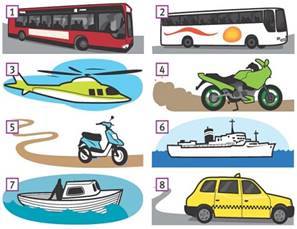
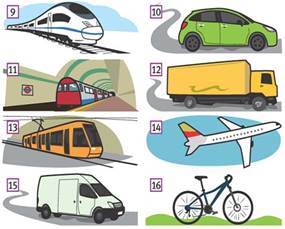
Bike, boat, bus, car, coach, helicopter, lorry, motorbike, plane, scooter, ship, taxi, train, tram, underground, train van
2. Образуйте формы глаголов с окончанием –ing, распределите их по группам:
have, come, listen, buy, swim, put, use, stop, drive, win, cry, travel, go
3. Составьте из слов предложения.
a). Anna – juice – is – orange – drinking.
b). not – sun – shining – the – is.
c). are – parents – the – in – my – sitting – garden.
d). dress – she – long – is – a – today – wearing.
e). we – playing – not – violin – are – the.
4. Запишите утвердительные (+), отрицательные (-), вопросительные (?) предложения, используя The Present Continuous.
1. George/drive very fast. (+) 2. I/learn Russian. (-) 3. It/snow. (?) 4. They/walk in the park. (+) 5. Sophie/eat berries. (-) 6. Mother/vacuum-clean. (?) 7. Jenny/write a postcard. (+) 8.We/swim in the swimming-pool. (-) 9. I/listen to music. (+) 10. Kevin/work. (?) 11. The nurse/feed the patient. (+) 12. The wind/blow. (?) 13. She/sing a song. (-) 14. The boys/ride horses. (?) 15. They/build a new house. (-)
Unit 13 (Урок 13).
Grammar: Past Simple, Future Simple
Speaking: Russian national symbols
1. Прочтите рассказ и ответьте на вопросы:
 a). Where was the girl?
a). Where was the girl?
b). Where was the dog?
c). Was it the girl´s dog?
One day Suzie was in the park. She was on a bench, and there was a big dog next to the bench. A man stopped in front of Suzie. He wanted to sit down, but he was a bit nervous. «Does your dog bite?» he asked her. «No, it doesn´t», Suzie replied.
A minute later, the dog closed its teeth round the man´s lag. «Ow!» he shouted. «What do you mean, your dog doesn´t bite? You lied!»
«That isn´t my dog», explained Suzie.
2. Прочтите тексты о национальных символах Российской Федерации. Расскажите о них своими словами.
● The Russian flag is sometimes called the IMPERIAL FLAG. It consists of three equal stripes of white, blue and red. The first flag of this design appeared more than 300 years ago. Peter the Great adapted the flag from the National flag of the Netherlands. Later a black two-headed eagle on a golden background was added to the flag of Russia. The flag existed until the revolution in 1917. In the nineties, with the democratic changes, the three-colour flag was restored again. On 21 August 1991, the flag was officially adopted by the Russian President and the Russian Parliament. In Russia the colours of the current flag symbolize:
• white - frankness and generosity;
• blue - honesty and wisdom;
• red - courage and love.
● The Russian National Emblem is the golden DOUBLE-HEADED EAGLE with a horseman (St George) on a shield on the eagle's breast with a red background. Above the two heads of the eagle, there is an historical crown.
The first emblem of the double-headed eagle was introduced in 1480, by Prince Ivan III. It was at the time of the establishment of the Russian state system. It symbolized the supreme power and sovereignty of the state.
Since then, the double-headed eagle is the main part of the emblem of our country. But now the crown is a symbol of the sovereignty both of the Russian Federation (as a whole) and of its parts (subjects of the Federation).
3. Раскройте скобки, употребив глаголы в форме The Past Simple.
1. We (to meet) in a café last night. 2. Max (to see) his friends after work two days ago. 3. We (to plan) our summer holidays two months ago. 4. Martin (to sing) a song at the college concert. 5. We (to have) a dinner at a restaurant the day before yesterday. 6. Tom (to phone) his girlfriend yesterday afternoon. 7. They (to leave) work at 18.00 last week. 8. Alex (to get) up late in the morning yesterday. 9. I (to tidy) my room at the weekend. 10. My girlfriend (to fall) ill three days ago. 11. Last year, we (to grow) potatoes in our garden. 12. Last year, she (to celebrate) Christmas at home. 13. Emily (to lose) her keys yesterday. 14. I (to wear) a new shirt to college the day before yesterday.
4. Отнесите следующие предложения к будущему.
Используйте слова: tomorrow, tomorrow evening, the day after tomorrow, next week, next month, next year, in an hour, at two o'clock tomorrow afternoon.
Образец: He studies at the institute. He will study at the institute next year.
1. My sister comes home at about 6 o'clock. 2. My little brother plays in the garden. 3. They live in Moscow. 4. They have English classes twice a week. 5. Anna gets up late. 6. She likes my presents. 7. I go to bed early. 8. He phones his friends.
Используемая литература:
1. Безкоровайная Г.Т., Койранская Е.А., Соколова Н.И., Лаврик Г.В. Planet of English: учебник английского языка для учреждений СПО. — М.: Издательский центр «Академия», 2015.
2. Безкоровайная Г.Т., Койранская Е.А., Соколова Н.И., Лаврик Г.В. Planet of English: электронный учебно-методический комплекс английского языка для учреждений СПО. - М., 2015.
3. Мюллер В.К. Англо-русский и русско-английский словарь. 65 тыс. слов с транскрипцией. М., ООО «Стандарт», 2015. – 704 с.
4. Резник Р.В. Грамматика английского языка для учащихся средней школы, М., «Просвещение», 2014
5. Гузеева К.Л. Справочник по грамматике английского языка, С.-Петербург, Союз, 2011
Интернет-ресурсы
Информационные электронные ресурсы: справочники, словари, обучающие и контролирующие программы, тесты для диагностики уровня знаний.
1. http://www.britannica.co.uk
2. http://en.wikipedia.org
3. http://www.study.ru
4. Scirus - бесплатная поисковая система в Интернет www.scirus.com
5. НАУЧНАЯ ЭЛЕКТРОННАЯ БИБЛИОТЕКА http://elibrary.ru
6. Общесетевая англоязычная виртуальная справка -AskJeeves www.ask.com
7. Answer bank www.theanswerbank.co.uk
8. Acronymfinder www.acronymfinder.com бесценный источник «расшифровки» аббревиатур
9. www.lingvo-online.ru (более 30 англо-русских, русско-английских и толковых словарей общей и отраслевой лексики).
10. www.macmillandictionary.com/dictionary/british/enjoy (MacmillanDictionary с возможностью прослушать произношение слов).
11. www.britannica.com (энциклопедия «Британника»).
12. www.ldoceonline.com (Longman Dictionary of Contemporary English).
Скачано с www.znanio.ru
Материалы на данной страницы взяты из открытых источников либо размещены пользователем в соответствии с договором-офертой сайта. Вы можете сообщить о нарушении.